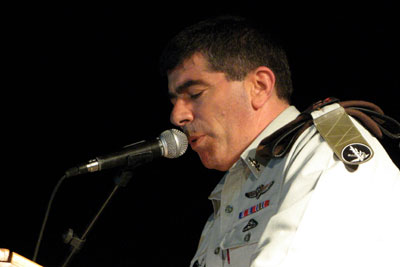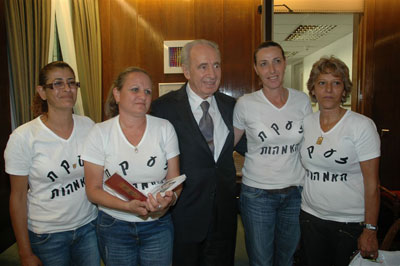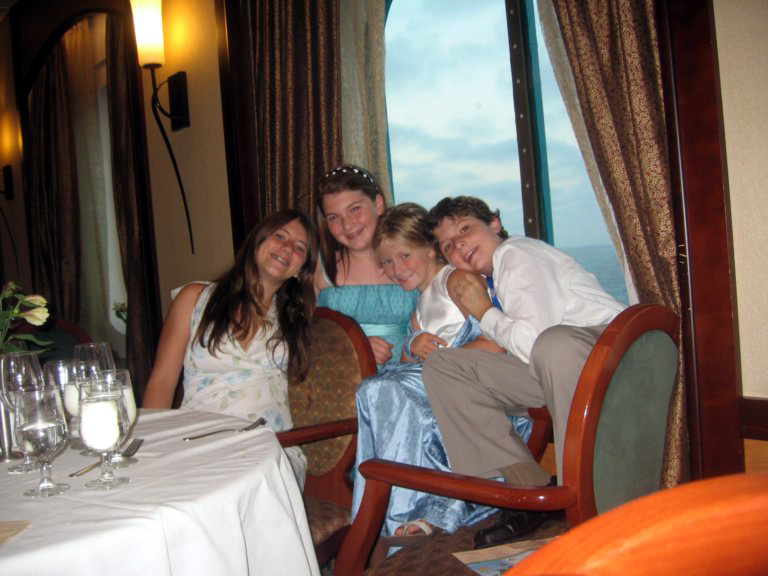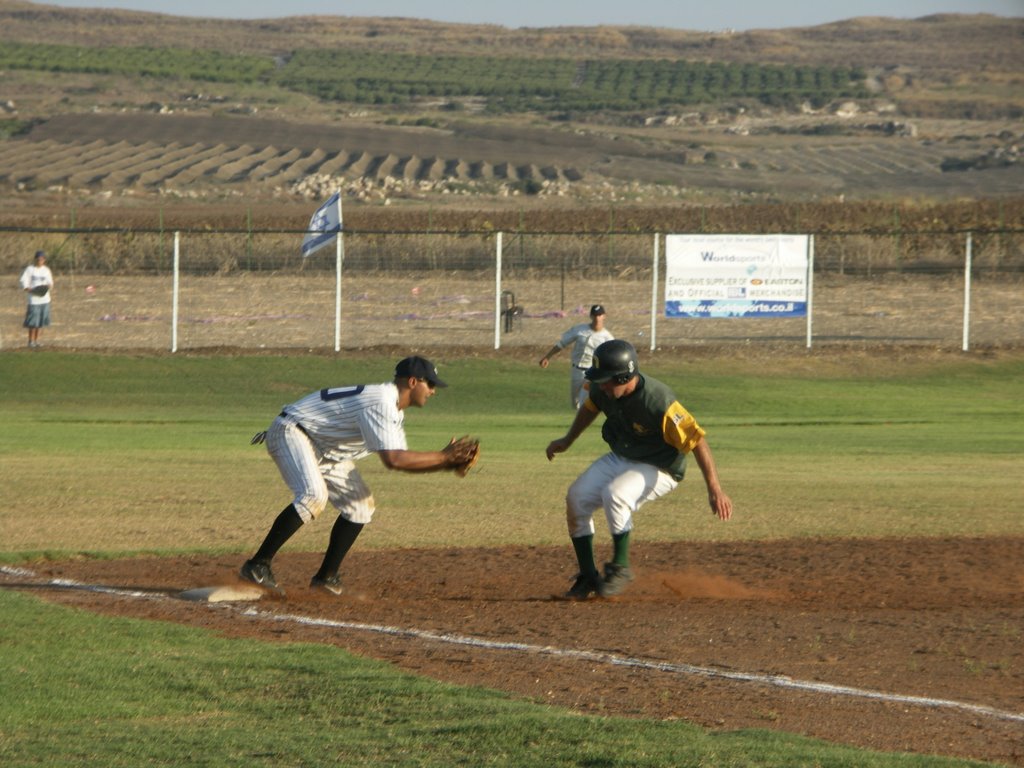
CHIEF OF STAFF—Lt. Gen. Gabi
Ashkenazi pays tribute to Druze soldiers past and present
IDF pays tribute to Druze community
CARMIEL, Israel (Press Release)—The Israel Defense Force (IDF)
and the Friends of the IDF Foundation marked Sunday as Druze
Soldiers’ Day. Thousands of soldiers and officers received
commendations for their actions and contribution to the security
of the state while serving in the military.
The day started at the ‘Country Club’ in Carmiel, continued with
a festive dinner for the Druze soldiers, both in regular and
reserve service and finished with the main ceremony. The entire
event took place in the northern Israeli city, which hosts the
Druze Soldiers’ Day. Among the prominent figures at the event
were the Chief of General Staff, Lieutenant General Gabi
Ashkenazi, the Mayor of Carmiel, Mr. Adi Eldar, and other public
officials.
“I have come here today to wish you a blessing on your festive day, in the ceremony which is taking place in your honor-in the honor of the soldiers and commanders of the Druze population,” the Chief of General Staff began. “The IDF in its entirety feels the utmost respect, honor, and gratitude to you, members of the Druze community. You have chosen to join us in our combined fate in the Nation of Israel.”
“The Druze soldiers can be
found today in every corps and in every branch of the military.
A Druze soldier can be part of any unit, and assume any
position, in accordance with his talents and abilities,” the
Chief of General Staff noted. He added:
“In the last draft, a Druze soldier went to IAF Flight School,
to the elite Shayetet 13 Unit, to the Sayeret Matkal elite unit,
and a great number of others serve in a wide range of units as
well as in all of the combat units of the IDF. I am proud to say
that the percentage of members of the community who enlist into
the IDF is worthy of presenting a figure for emulation for all
the youth of Israel.”
“The integration of Druze
soldiers into the IDF can be seen in all of its branches, as
well as in leadership positions,” notes Colonel Ramiz Ahmed,
head of the population directorate in the Human Resources
Branch.
The percentage of enlistment from the Druze population is
currently 82.9 percent, which is very impressive in comparison
to the national enlistment percentage.
Another interesting issue is the bravery of six Druze soldiers
and a battalion of Druze infantry in the Second Lebanon War,
which are expected to receive a citation for exemplary service
for their exceptional sacrifice during the war.
“Today, when evasion of the draft is such a serious issue, these
figures serve as a good example, displaying the high motivation
level of Druze soldiers, and their quality in addition to the
sheer numbers,” said Colonel Ahmed.
He concluded: ”I think that this event will strengthen the
integration of Druze soldiers into the IDF, and will encourage
others who have not yet enlisted to do so and make their
contribution to the state-I have no doubt about it whatsoever.”
The preceding story was provided by the Israel Defense Force
|
|
|

FOUR MOTHERS—President
Shimon Peres meets with 'Four Mothers' opposing violence in Israel
society
Photo by Israel Neustein,
Noy Photos, distributed by the office of the president
Peres joins the cause of
the Four Mothers
JERUSALEM (Press Release)—The President of Israel, Mr. Shimon Peres, met
on Sunday at noon with the four mothers who are leading the fight to
eradicate violence from Israeli society. The mothers requested a meeting
with the President in the hope that he would join in the fight and help
them continue in additional directions.
During the meeting, which was moving and personal, President Peres said
that he is proud of the fight and salutes the mothers for having raised
the issue of violence in Israeli society on the public agenda: “You have
achieved your aim of raising the issue on the agenda and now the fight
must be transferred to the corridors of the Knesset. What you have done
is not only for your children’s benefit but for all the children in
Israel. I will be pleased to be of assistance. The President’s Residence
will be open to you and I will help with whatever possible.”
At the end of the meeting the mothers stated that following the
President’s announcement that he would join the fight and that they had
succeeded in raising the issue on the public agenda and transferring it
to the Knesset, they would take down the protest tent opposite the Prime
Minister’s house. “We are returning home and are continuing the fight in
the corridors of the Knesset and the Government,” they announced.
The President and the mothers expressed the mutual hope that the society
in Israel, the Knesset, the Government and the courts of law would show
“zero” tolerance towards any expression of violence in society, that the
punishment would become more severe and that extensive legislation would
be carried out, which would create fear among criminals and help the
families harmed by violence.
Yehudit Mor, the mother of the late Sergeant Raz Mor, who was murdered
in Moshav Granot at the entrance to the Moshav’s club, thanked the
President most sincerely for his willingness to help, for his listening
and for his sympathy for their pain and emphasized that the fight had
not ended but is being transferred to the parliamentary and governmental
arena. “In order to translate our demands to the legal and practical
level.”
The preceding story was provided by
the office of President Shimon Peres
Israel-Jordan
artificial reef stirs worldwide interest
By Nicky Blackburn
EILAT, Israel (Israel 21C)—Take a dive off the coast of Eilat these days and you're liable to find yourself swimming around a huge yellow concrete and wire construction that stretches four yards up from the seabed, is four yards wide, and is full of holes. No, this isn't some strange new structure left behind by an alien race, or cargo dropped from a sinking container shop, this is the first artificial coral reef in the Red Sea.
The reef, which was developed by the Israel Nature Parks Authority and a team of academics from the National Center for Mariculture at the Eilat campus of Ben Gurion University, the Inter-University Institute for Marine Sciences in Eilat, the Hebrew University, and the Marine Science Station in Aqaba, is a unique new approach to conservation in the Red Sea and part of a joint co-operative project between Israel and Jordan
Coral reefs are one of the most varied forms of life on the planet, and the range and richness of the species found there are comparable to that of the tropical rain forests. In recent years, underwater diving has become an increasingly popular sport and the breathtaking reefs of the Red Sea area, which are different from any other reefs around the world, have suffered dreadfully as a result.
"The number of visitors is large and the size of the reefs is limited and too small," explains Dr. Nadav Shashar, the supervisor of the research project, and a marine biologist at the National Center for Mariculture. "Because of the increase in the number of visitors, the coral reefs are unable to overcome the damage caused and are beginning to die out. If we don't act quickly, it's only a question of time before the excellent breeding conditions in the north bay become barren. Many bodies are aware of the problem and are seeking a way to solve it."
Part of the problem is novice divers. "They kick up the sand, or damage the corals by accident. Multiple that by 100,000 people and that's considerable damage," says Shashar. "These people don't mean to harm the reefs, but they just don't know how to dive properly."
The developers hope that the artificial reef will create a new attraction for these divers, steering them away from the natural reefs, reducing the pressure there and enabling them to recover from some of the damage inflicted on them over the last few years.
At the same time, the Tamar reef which is located near Coral Beach also provides the researchers with a unique underwater laboratory, enabling them to observe and unravel the development and growth of this unique and complex ecosystem.
"Our task is to understand which factors bring about the development and proliferation of coral reefs, to understand the growing processes of the coral and fish populations and to put this into practice in establishing artificial coral reefs that will attract tourists," Shashar tells ISRAEL21c. (Jump to continuation)
 Letter from Jerusalem By Ira Sharkansky |
Videos refute Arab version
of Jerusalem gunfight
A few days ago the news reported that an Arab from the Galilee
snatched a pistol from one of two security guards in the Old
City of Jerusalem. The Arab managed to wound one of the guards
before the other one shot him dead. In the exchange of fire, a
number of passers-by were also injured. According to the
security guard, it was the Arab who was firing wildly as he ran
away, and it was his shots that injured by-standers.
According to members of the Arab's family. It could not have happened that way. The man was law-abiding, a husband and father of a small child. He was set up by the Jews. Then he was murdered by one of the security guards when he lay injured and helpless on the ground.
Israeli investigators do not buy that version. And they have considerable backing from the security cameras that operate in much of the Old City. We have seen the film on TV news. It shows the Arab stalking the two security guards as they walk along the street, then taking the pistol of one from the holster on his belt, running away and firing several times in the direction of the uninjured guard who was pursuing him. The last picture shows the Arab wounded and falling to the pavement. There is no picture relevant to the claim that the guard fired a fatal shot into the injured Arab.
The man's family says that all the pictures were fabricated. Their boy could not have done it.
Today I received e-mail from the Arab Association for Human Rights. These come periodically, one version in Hebrew and another in English. This issue concerns last year's Lebanon War. It notes the incidence of Arab civilian casualties in the north of Israel. Guess who is to blame? Israel, for putting its soldiers close to Arab communities, and thus exposing them to the rocket attacks. Moreover, it is Israel's fault that Arab communities had few if any warning sirens or bomb shelters. All of this amounts to a violation of international law. Next we will hear from the United Nations General Assembly.
Implicit here is the defense scheme that would be permitted by the Arab Association for Human Rights. Israel should position its army only around the high concentration of Jewish settlements in the center of the country. Hizbollah and its friends can do what they want in the Galilee, heavily populated by Arabs who should not be endangered by Israeli soldiers. The Jewish country should defend itself only where Jewish civilians might be hurt by the military operations.
It is true that Arab towns are not well protected by sirens or air raid shelters. However, that is at least partly the responsibility of the Arab elected officials of those towns, who choose not to spend money on such things, or to enforce Israeli laws requiring shelters to be part of any residential construction.
One of Israel's political parties (Israel Our Home), with 11 seats in the 120 member Knesset, heavily supported by Russian immigrants, and currently with a place in the government coalition, proposes trading areas of Israel heavily populated by Arabs for areas of the West Bank where there are substantial Jewish settlements. The Israeli Arabs would go along with their land and dwellings to Palestine.
There is no indication that sizable numbers of Israeli Jews currently accept this idea. The scheme is opposed intensely by Israeli Arab politicians, who cite their own loyalty and that of their constituents to Israel. Most of those politicians also demand the right to express their support for various actions of Palestinians and Arabs who are not friends of Israel.
Among my students who have been the best academically and the most congenial on a personal level have been Arabs from Israel or Palestine. Also, I have no complaints about the Arab families and young singles moving into my neighborhood of French Hill. None of which leads me to accept everything I hear from the other Arabs of Israel and nearby countries.
My American friends and relatives can expect lots of new Arab
neighbors. The current frenzy against immigration may delay the
flood, but the better sentiments embedded in American culture
will open the gates for the refugees produced by American
actions in Iraq, Afghanistan, and maybe elsewhere. I hope that
the vast majority will be good neighbors, not only in the
initial years but in subsequent generations. And insofar as
America is likely to be important to Israel as far toward the
end of days as we can see, I also hope that for myself and mine.
LONDON (Press Release)—British trade union leaders have begun to distance themselves from boycott Israel motions passed at trade union conferences. According to the UK’s Jewish Chronicle newspaper, the head of Unison, one of Britain's biggest and most pro-Palestinian unions, has written a warm "personal" letter to the head of the Histadrut, Israel's trade union movement.
Unison secretary-general Dave Prentis - whose organisation's conference called for a "concerted economic, cultural, academic and sporting" boycott - told Histadrut head Ofer Eini that the resolution "does not commit Unison to boycott Israel or Israeli organisations."
The joint chair of the Stop the Boycott Campaign, Lorna Fitzsimons, paid particular tribute to the Trade Union Friends of Israel, whose director Steve Scott, she said, had played a major role in pushing back the boycott tide.
Meanwhile, the
council of Cambridge University has unanimously rejected calls
for a boycott of Israeli academic institutions. At a meeting at
the end of last month, the council unanimously endorsed a
statement issued by Universities UK opposing any proposed
academic boycott by the University and College Union.
MOSCOW (Press Release)—A close adviser to the Russian President, Vladimir Putin, has claimed that the UK’s foreign minister, David Miliband, had inherited a hatred of Russia from his Polish grandfather Samuel.
Gleb Pavlovsky, leader of an influential think-tank, said Samuel fought against Russians during the turbulent 1920s and accused the MPs' grandfather, who died 40 years ago, of fighting under the command of Leon Trotsky to kill Russians opposed to communism.
The accusations are the latest incident in a diplomatic stand-off between Russia and UK over Russia’s refusal to extradite the man believed to be responsible for the murder in London, with radioactive material, of former KGB agent Alexander Litvinenko.
The preceding story was provided by the World Jewish Congress
New chair
says HIAS must be alert, on guard,
for Jewish refugees from Iran and Venezuela
NEW YORK
(Press Release)—The
head of a Boston technology investment firm who was named chair of
the board of directors of HIAS, the Hebrew Immigrant Aid Society, in
June – warned in his first address to the board that the American
Jewish community must remain Al HaMishmar (on guard)
because of ongoing issues around the world.
“In this ever shrinking planet, still sadly engaged in genocide and
oppression, HIAS expresses the Jewish value: I am my brother’s
keeper,” said Michael Rukin, CEO of Concord Hill Group Trust in
Boston. “HIAS means so much to so many people around the world. In
its 125-year history, it has resettled more than four million Jews,
including my grandparents and father, to lands of safety.”
Excerpts from Mr. Rukin’s remarks, made last week at the
international organization’s headquarters here, continue:
“Though the great waves of Jewish emigration are probably behind us,
we must be ever vigilant: Al HaMishmar (On Guard).
The dangers affecting Jewish survival in Venezuela and in Iran are
clearly in front of us. The longer term issues of polarization,
resulting from demographic changes, in France and in England, with
their implications for Jews, must remain within our vision.
“Though we operate today with a strong and vibrant Jewish homeland, the agenda of the status of olim and of refugees arrived in the State of Israel must also concern us, for we are commanded to be an Or l’goyim (A light unto the nations). The increasing numbers of Sudanese and other Africans who enter Israel by crossing the Sinai border illegally is a dilemma for Israel, but it is not just Israel’s issue. It affects us as Americans and particularly as American Jews.
“Even here in America, we cannot look back. The American Jewish community looks to us as the leading research and advocacy voice for: immigration reform; the extension of benefits to elderly immigrants who we brought here; providing programs of American and Jewish acculturation to those we brought here; and to lead a network of local agencies that are the core fabric of the American Jewish communal structure. So too does the United States government, both the legislative and executive branches, look to us and our Washington office for advice, insights and ideas… and occasionally for less than gentle nudges. Our relationship with the United Nations High Commissioner for Refugees gives us a unique opportunity to defend Jewish views at council tables which have been too often politicized by anti-Israel interests.
“We may not look back and yet, our history resonates in everything we do. As I write this a member of the HIAS executive staff is in Cairo accompanying Assistant Secretary of State Kelly Ryan, teaching a seminar to U.S. State Department staffers. His role is hardly different from the trip taken to Romania in 1900 by Dr. David Blaustein, then secretary of HIAS, accompanying Robert Watchorn, then commissioner of Ellis Island, to make an on-the-spot evaluation.
“But if these parochial concerns were, alone, the focus of our agenda, alas, we would be ignoring history and a central pillar of our heritage. Isaac Bashevis Singer was once asked: “Do you believe in free will?” His answer: “Of course I do. I have no choice!” We have no choice, in this ever smaller and interdependent world. The history of the Shoah taught us in the words of the German pastor, Martin Niemöller, who retrospectively bemoaned his having been silent as the Nazis arrested the members of differing groups to which he did not belong: ‘And when they came for me, there was no one left to speak out.’
“Looking forward we must both attend
to our core mission and, within the constraints of
our fiscal resources, advocate for and act on behalf of the
persecuted and the oppressed of all persuasions. We must do it
because it is part of our heritage. We must do it because it is good
for the Jews. We must do it because our children and grandchildren
will measure their attachment to our heritage and its values, based
on what we DO, as differentiated from what we say.”
Rukin has been active in local, national and international Jewish
organizations for the past three decades, including the Combined
Jewish Philanthropies in Boston, where he was chairman of the board
from 1996 to 1999. He led the effort of the then Council of Jewish
Federations to establish Hillel: the Foundation for Jewish Campus
Life, whose board of directors he chaired from 1995 to 1998. He has
also served on the boards and executive committees of United Jewish
Communities, the Union for Reform Judaism, and the Joint Commission
on Social Action of Reform Judaism.
An early activist in the Soviet Jewry movement, Rukin served on the
boards of the National Conference for Soviet Jewry and the Union of
Councils for Soviet Jewry. In Israel he has chaired the board of
overseers of the Jerusalem Center for Public Affairs and served on
the board of governors of the Jewish Agency for Israel. He holds a
BEE degree from the City College of New York and an MSEE from
Northeastern University. He is active in the arts world and collects
20th Century art of Japan. He was the founder and CEO of Analytical
Systems Engineering Corporation, a pioneer in the fields of radio
navigation and physical security systems.
With offices on five of the world’s continents and headquartered in New York City, HIAS has helped to rescue and resettle more than 4.5 million refugees since it began operations in 1881.
The preceding story was provided by the Hebrew Immigrant Aid Society (HIAS)
NEW YORK,
N.Y (Press Release)—New York politician and Independence Party activist
Lenora Fulani has for the first time renounced her past anti-Semitic
rhetoric and declared that she is considering running for mayor. Fulani had
previously refused to disavow her 1989 statement that "Jews had to sell
their souls to acquire Israel" and had to "function as mass murderers of
people of color." Other statements she's made over the years, including
saying in 2001 that U.S. foreign policy played a role in the 9/11 terror
attacks, have drawn criticism, though she hasn't retracted them. At a press
conference on the City Hall steps Fulani said, "My comments reflected my
feelings about the situation during that time. I felt it important to stand
up for the people I thought were singularly oppressed. The language I used
was harsh and today I would call it excessive," she added, insisting she
"never intended to express anything demeaning or derogatory to Jewish people
here or in Israel ... I do not view Israel as an aggressor. In light of
that, I am repudiating my remarks of 18 years ago," she said.
(Return to top)
Possible NYC mayoral candidate Lenora Fulani
repudiates her past anti-Semitic comments
The preceding story was provided by the World Jewish Congress
LOS ANGELES—The Simon Wiesenthal Center deplores a resolution passed
this weekend at the 10th biennial Assembly of the Evangelical
Lutheran Church in America (ELCA) to ‘study’ the feasibility of a
boycott against goods produced in Israeli 'settlements.'
"This marks the first time a mainline American Protestant church has
moved toward a possible boycott of Israel," said Rabbi Abraham
Cooper, Associate Dean of the leading Jewish human rights group.
"While we note that the ELCA delegates have now joined the
Presbyterian Church (USA) in explicitly rejecting divesting from
companies doing business with Israel, they have decided to embrace
one of the anti-Israel tactics adopted by United Kingdom trade
unions and others in Europe."
“ELCA delegates would have made a stronger contribution to the quest for peace and justice in the Holy Land had they also raised the ransacking of Christian places of worship and recent forced conversion of a Christian professor in Gaza, as well as the unrelenting targeting of Israeli civilian communities by Palestinian Kassam rockets,” Cooper concluded.
In recent years, factions in some U.S. mainline Protestant churches like the Presbyterian Church USA and the United Church of Christ have proposed and even passed measures such as divestment and boycotts to punish Israel for implementing what they call “apartheid” conditions on the Palestinians. The Simon Wiesenthal Center has launched efforts to show members of these various congregations that such measures are one-sided in that Israel is singled out and held to a standard to which no other country is held.
The preceding story was provided by the Simon Wiesenthal Center
|
|
Adventures in Cruising—Royal
Caribbean's Monarch of the Seas Dress Night: Shea Oades, 11; Ashlee Ford, 11; Sara Oades, 7, and Tyler Ford, 9, strike a happy pose in the dining room Thanks to the Ford family of Agoura, California, for sharing their photos of their family reunion weekend cruise |
WASHINGTON, D.C—Congressman Robert Wexler (Democrat, Florida) and 16 Members of the Florida Congressional delegation earlier this month sent a bipartisan letter to the President’s of ten Florida state universities asking them to publicly reject the University and College Union (UCU) of the United Kingdom’s recent vote to boycott Israeli academia.
In the letter, Wexler and his Florida colleagues urge the university Presidents to support congressional efforts expressing disapproval of the UCU’s attempts to stifle intellectual freedom and reject blatant anti-Israel bias. As a sign of solidarity with Israel and its academic institutions, on July 11, 2007 the House of Representatives unanimously passed House Resolution 467, condemning the UCU’s decision to boycott Israeli academia.
“The UCU boycott of Israeli academics is unjustified and a direct assault on the principles of academic freedom and open exchange,” Congressman Wexler said. “It is critical that university Presidents and Academics in Florida and across the United States stand with Israeli Academics in light of this misguided boycott.”
The congressional letter urges the presidents of the State Universities in Florida -- including Florida A&M University, Florida Gulf Coast University, Florida International University, Florida State University, New College of Florida, University of Central Florida, University of Florida, University of North Florida, University of South Florida, University of West Florida – to follow the lead of Florida Atlantic University President Frank Brogan and Nova Southeastern University in publicly opposing the UCU’s decision. (jump to continuation)
Behind the scenes in the wiretapping debate
(Editor's Note: We
offer today's column by Shoshana Bryen of the Jewish
Institute for National Security Affairs as fuel for
thought on the issue of wiretapping and national
security. We will run part two of her
reportage tomorrow.)
By Shoshana Bryen
WASHINGTON, DC (JINSA)—In principle it seems the right - and the duty - of the government to try to find terrorists abroad before they act, before they come here, and/or before they instigate a terrorist act here. Surveillance is crucial.
Under the 1978 FISA (Foreign Intelligence Surveillance Act) law, U.S. intelligence services could listen without a warrant to foreign-to-foreign communications relayed - as most calls then were - wirelessly. Technology advances however, and today 90 percent of global communications pass through fiber optic cable. The National Security Agency (NSA) has been monitoring foreign-to-foreign communications by tapping into the U.S.-based cables as transmissions pass through our territory on their way back abroad.
NSA considered the routing to be incidental to the fact that the communications were between people located abroad.
Two court rulings in the spring stopped the process - the first challenged the collection of data from wires even when the target was a terrorist source; the second ruled that warrants from the FISA court were required for any wire-based communication surveillance. NSA immediately began asking for warrants - thousands of them - but the court could not keep up. "We needed thousands of warrants, but the most we could do was hundreds," said one NSA official. According to The Washington Post, NSA Director Michael McConnell told the Senate Intelligence Committee, "We are actually missing a significant portion of what we should be getting."
NSA appealed to the court, which said it was only enforcing the law and that a legislative fix was required to restore the permissibility to intercept foreign-to-foreign communications without a warrant.
In April, the administration sent a bill to Congress to close the technological gap in surveillance policy. The Democratic leadership planned to put off the debate until after the summer, but in August, McConnell came before a closed group of senators from both parties with what was considered important information about terrorist activity and a precipitous decline in American ability to keep pace with surveillance. Members of both parties agreed that immediate - if temporary - action was required.
The House and then the Senate passed a revised version of the law as they were headed out the door, including an interesting proviso that would "allow the interception and recording of electronic communications involving, at least in part, people 'reasonably believed to be outside the United States' without a court's order or oversight, according to The Post. This takes into account the fact that cell phones can be used across continents.
So, you may think, great. When push and shove came together, the Democrats and Republicans listened to the experts, and fashioned legislation that gave the administration the powers it sought to protect the country. Not great, because politics were involved every step of the way and the real battle is set up for September. We'll have more to say tomorrow.
To share your thoughts on
this topic, please send an email to us at
sdheritage@cox.net.
Please be sure to include at the bottom of your letter your full name
and the city and state (province) in which you reside.
________________

Click the ad above to go to the "I'm there for you baby" website
The Jewish Grapevine

|
CYBER-REFERRALS—Israel's
Consulate
General
draws
attention
to a
story
in
the
Israel
Insider
about
a
rally
for
freedom
being
suppressed
in
Gaza
City
today
by
Hamas.
Here
is
the
link
...
Bruce
Kesler
recommends
a
lengthy
article
on
the
role
philanthropists
can
play
in
the
Middle
East
debate
by
endowing
university
chairs
and
programs
on
the
Middle
East—which
is
already
being
done
by
Saudi
interests.
Here
is
a
link.
...
OUR
U-T
TOUR—So
what
did
the
San
Diego
Union-Tribune
do
today
with
news
of
specific
Jewish
interest?
Here's
what
we
noticed
during
our
perusal
over
a
morning
cup
of
coffee.
Front
Section—Apparently
desirous
of a
spirited
challenger
against
City
Attorney
Michael
Aguirre,
the
newspaper
ran
a
lead
article
by
Alex
RothInsi
with
the
headline
"Few
want
to
run
against
Aguirre:
Controversial
city
attorney
has
one
declared
challenger."
Evidently
feeling
that
attorney
Daniel
Coffey
may
not
be a
serious
political
contender,
the
newspaper
sent
out
feelers
to
former
U.S.
Attorney
Alan
Bersin
and
former
State
Assemblyman
Howard
Wayne,
who
said
one
reason
why
his
interest
is
low
is
that
it
might
take
$1
million
to
conduct
such
a
campaign...Inside
there
were
two
Middle
East
stories
on
page
A-7,
neither
particularly
boding
well
for
Israel.
One
said
that
the
Foreign
Affairs
Committee
of
Britain's
Parliament
is
recommending
direct
talks
with
Hamas
and
Hezbollah,
as
well
as
the
Muslim
Brotherhood,
notwithstanding
any
concern
that
they
might
be
terrorist
groups
because
their
influence
can
no
longer
be
discounted.
The
British
government
will
now
consider
the
recommendations.
(See
our
News
Sleuths
column
below)...
Next
to
that
AP
story
was
another
by
Laurie
Copans
of
Associated
Press
telling
about
Mariya
Aman,
6,
who
was
paralyzed
from
the
neck
down
by
an
Israeli
missile
that
exploded
in
Gaza
during
battlefield
action.
She
has
been
treated
and
receiving
rehabilitation
in
Jerusalem,
but
now
doctors
want
to
send
her
to
the
West
Bank.
Her
father,
a
Gazan
who
wants
to
become
an
Israeli
citizen,
objects
saying
the
Palestinian
territory
doesn't
have
the
equipment
necessary
to
sustain
her.
The
case
is
before
the
Israel
High
Court.
Local
Section—John
Marelius
covered
Democratic
presidential
candidate
Dennis
Kucinich's
foray
into
town
yesterday,
quoting
him
as
saying
"strength
through
peace
means
a
president
who
will
engage
directly
with
the
leaders
of
the
world,
who
will
go
and
meet
with
leaders
in
Iran
and
Syria
and
will
go
to
Israel
and
Palestine
and
owrk
on
peace
through
the
Middle
East."
Currents—Lee
Grant,
who
knows
the
meaning
of
the
term,
described
Seth
Rogen
as a
nebbish
in
the
movie
Knocked
Up
and
went
on
to
quote
him
on
why
he
previewed
his
new
movie
Superbad
at
Comic-Con
in
San
Diego.
"Well,
it's
about
guys
who
spend
too
much
time
with
other
guys
and
can't
get
girls,
so
it
was
the
perfect
place."
Sports—Box scores were where you'd find Jewish players, assuming you knew their names. In National League games: Shawn Green went 0-4, striking out twice, but his teammates won convincingly anyway 10-4 over the Florida Marlins. Brad Ausmus only hit in his Houston Astros 5-4 victory over the Milwaukee Brewers was his 14th double of the season, which drove in his 22nd RBI. But his stats also had a more sour abbreviation: GIDP, meaning grounded into double play.... In the American League, the Baltimore Orioles knocked off the Boston Red Sox 6-3, with Sox first baseman scoring one run on one hit and two walks. He advanced to scoring position for two of those plays, but then was left stranded. And Texas Rangers second baseman Ian Kinsler hit his 16th double of the season, accounting for his 40th and 41st RBI of the season, as the Rangers speared the Tampa Bay Devil Rays 9-1.

|
|
Place: U.S. State Department
Spokesperson: Sean McCormack
Source: State Department Transcript
QUESTION: Sean, the British House of Commons Foreign Affairs Committee has said that Britain's and the international community's refusal to speak to the Palestinian movement, Hamas, is doing more harm than good and it will further jeopardize peace. Do you have any comment on that?
MR. MCCORMACK: I haven't seen the statement or this report. I don't know where that comes from. But the Quartet which comprises the EU, the United States, the UN, as well as Russia, all believe as well as others, that dealing directly with Hamas in the absence of their -- the meeting of the conditions laid out by the Quartet, is not something that we would do. They -- now they were in government, they consistently refused to meet those requirements and I haven't seen any indication thus far that they are planning to meet those requirements and just the opposite. Their recent actions were over the past month and a half or so in Gaza would indicate that they have no intention of trying to meet the conditions laid out by the international community.

{Click the above ad for more information

News from the Israel Baseball League |

From 1-7 deficit , Tigers went to 7-7 against Lightning, and then the lights went out
By Andrew Wilson
TEL AVIV, Israel (Press Release)- In a wild game at Sportek in Tel Aviv, the Netanya Tigers clawed their way back from a 7-1 deficit to tie the game at 7 apiece against the Tel Aviv Lightning. The game was suspended due to darkness and will be made up only if there is a direct impact on the playoff seeding.
California native left handed pitcher Aaron Pribble started for the Lightning, holding the Tigers scoreless through three innings. Tel Aviv scored five runs on four hits in the third inning. Dominicanshortstop Raul Franco (3-for-4) scored the first run of the game for Tel Aviv when third baseman Nate Fish drove him in with a pop single to first base.
Netanya answered back with six runs on six hits in the bottom of the sixth inning off Tel Aviv pitcher Adam Crabb. Dominican shortstop Hector De Los Santos was 3-for-3 on the day raising his batting average to .313 on the season. The Tigers need to win one more game to clinch the fourth seed.
Meanwhile at Gezer Field, the Ra'anana Express defeated the first-place Bet Shemesh Blue Sox, 8-3, to remain in contention for the fourth seed. Right handed pitcher Joshua Zumbrun (2-4) recorded the win for Ra'anana, pitching six innings innings allowing three runs (two earned) while striking out three. Both Ra'anana and Bet Shemesh scored one run in the first inning. The Express took a 5-1 lead in the third inning on a three-run homerun by first baseman Scott Feller, his second of the season.
Bet Shemesh resident Jeff Mor suffered his first loss of the season, pitching 2.1 innings and allowing five earned runs. First baseman Johnny Lopez hit a two-run homerun, his 14th of the season, in the sixth inning to bring the Blue Sox within five runs.
At Yarkon Field in the Baptist Village, the Petach Tikva Pioneers won a comeback victory, 7-4, against the Modi'in Miracle. Fifty-one-year old right handed pitcher Scott Cantor recorded his second victory of the season for the Pioneers, pitching a complete game and holding the Miracle scoreless for the last three innings. Cantor kept the Miracle batters off-balance throughout the night, with a variety of off-speed pitches.
The Pioneers battled back from deficits of 3-0 and 4-2, before taking the lead in the fifth
inning. Outfielder Ben Dashefsky was 2-for-4 with one run scored for the Pioneers. Outfielder Ryan Crotin, who was 1-for-3 on the night, had a two-RBI double in the bottom of the third inning to bring in the first two runs for the Pioneers. The Pioneers scored two runs in the bottom of the fifth on RBI singles by third baseman Willis Bumphus of San Diego and first baseman Alper Ulutas.
Summaries:
1 2 3 4 5 6 7 R H E
Ra'anana 1 0 4 0 3 0 0 8 8 2
Bet Shemesh 1 0 0 0 0 2 0 3 8 0
W: Joshua Zumbrun (2-4) L: Jeff Mor (2-1) ; HR: Scott Feller (2); Johnny
Lopez (14)
Suspended
1 2 3 4 5 6 7 R H E
Tel Aviv 0 0 5 1 1 7 7 0
Netanya 0 0 0 1 6 7 10 3
W: L: ; HR:
1 2 3 4 5 6 7 R H E
Modi'in 1 0 2 1 0 0 0 4 10 2
Petach Tikva 0 0 2 1 2 2 x 7 9 3
W: Scott Cantor (2-4); L: Ian Okorofsky (0-3) ; HR: None
Standings:
Team W L % GB
Bet Shemesh Blue Sox 28 10 737 -
Tel Aviv Lightning 24 14 .632 4.0
Modi'in Miracle 21 17 .553 7.0
Netanya Tigers 18 20 .474 10.0
Ra'anana Express 16 23 .405 12.5
Petach Tikva Pioneers 8 31 .205 20.5
Prior to Tuesday's games, IBL players and coaches will attend a tree planting ceremony in Neot Kedumim hosted by the Jewish National Fund. Later, at 5 pm the Petach Tikva Pioneers and the Modi'in Miracle play atKibbutz Gezer while the Bet Shemesh Blue Sox and Tel Aviv Lightning play at Sportek in Tel Aviv. At 7 pm the Netanya Tigers take on the Ra'anana Express at Yarkon Field at the Baptist Village.

{Marc Kligman, who combines being
a sports agent with his life as an observant Jew, invites you to listen.
Click on the ad above for more information}.
 People
of the Books People
of the Books |
Rabbi
Judah Loew's Prague-matic
creation
The Golem and the Wondrous Deeds of the Maharal of Prague by Y. Yudl Rosenberg, edited and translated by Curt Leviant; Yale University Press, New Haven CT.; ISBN 978-0-300-12204-6, 2007, $25.00, p.221
WINCHESTER, California—A golem
is a Jewish robot. Unlike
today’s robots, which are
fabricated from some amalgam of
metallic alloys and digitally
controlled, a golem is made from
the clay of the earth and
brought to life through Jewish
magic. The idea of inanimate
objects becoming animate dates
back to the time of the Greeks
and the story of Pygmalion and
his statue of Galatea. The
Talmud, the written compilation
of the Jewish oral traditions,
is the source of the word golem
as an automaton, or soulless
being.
The Talmud tells the story that
Rava created a golem using his
knowledge from a very early
kabbalistic book, Sepher Yetzira,
the Book of Formation. He sent
the golem to Rav Zeria. After
speaking to the golem and
getting no reply, Rev Zeria
realized that the being was a
golem and ordered it to return
to the dust. Golems, according
to tradition, are speechless
because speech comes from the
rational soul, which only God
can give.
A golem is incapable of
disobeying its creator, but in
one story, a sixteenth century
rabbi, Eliyahu of Chelm, created
a golem that grew bigger and
bigger until the rabbi was
unable to kill it without
deception. Upon its death, the
golem fell over the rabbi and
crushed him to death.
Additionally, there are those
who believe that the great
Middle Ages’ Jewish mystical
poet Solomon Ibn Gabirol created
a female golem to serve as a
housemaid.
The first story about a golem
printed in the popular press
appeared in 1847, in a book of
stories by Wolf Pascheles of
Prague. Since then, stories
about golems have appeared in
both print and in the movies
many times beginning in the
twentieth century. Stories
appeared in German and Yiddish
through the teens and twenties,
and in German and French films
in twenties and thirties. In the
1980s, both Elie Wiesel and
Isaac B. Singer wrote children’s
books about a golem. The golem
even made it to television by
appearing in a 1997 X-files
episode. In these and in many
other stories and movies,
authors and screenwriters
portrayed the golem like Mary
Shelly’s Frankenstein, a monster
and an evil killing machine.
The original story about Rabbi
Judah Loew (1525-1609), known as
the Maharal of Prague, and his
golem appeared in 1909 by the
Polish orthodox rabbi and
kabbalist, Y. Yudl Rosenberg.
Because the rabbis at that time
considered any writing unrelated
to Talmudic and other erudite
learning frivolous, Rosenberg
successfully argued that the
books’ author was actually the
Maharal’s son-in-law, Rabbi
Isaac Katz, and that he obtained
the book at great expense. These
stories became so popular over
the years that fact and legend
grow to be indistinguishable.
Yet, Rosenberg was all but
forgotten. Curt Leviant does us
an immense service by providing
the English-language reader with
a wonderful first-ever
translation of Rosenberg’s
The Golem and the Wondrous Deeds
of the Maharal of Prague
from the original Hebrew and
bringing Rosenberg’s name to the
forefront.
Judah Loew ben Bezalel, an
important religious figure in
Prague, was well-known for his
scholarship in the Talmud and
knowledge of the Jewish mystical
arts. He eventually became the
Chief Rabbi of Czechoslovakia,
and the people lovingly called
him the Maharal, a Hebrew
acronym for “Our Teacher, Rabbi
Loew.” The Czech government held
him in high esteem, and he even
met with Emperor Rudolf II on
more than one occasion.
Blood libels, an insidious form
of anti-Semitism, are
accusations by Christians that
Jews kill Christian children
(ritual murder) for the purpose
of draining their blood to make
matzos for Passover. Blood
libels are an urban legend first
documented in Germany in 1475.
Although the extent to which
blood libels were a problem
during the Maharal’s leadership
is open to question, Rosenberg
has the Maharal create a golem,
a superman, through Jewish
mysticism to assist him
bring-to-justice those who
falsely accuse Jews of this
crime. It should be noted that
blood libels were a growing
problem in Eastern Europe during
Rosenberg’s formative years, and
perhaps his book was his plea
for divine intervention.
The Golem and the Wondrous Deeds
of the Maharal of Prague, which
covers the exploits of the Rabbi
and his golem from 1580-1590, is
more than a set of stories.
Rosenberg gives us glimpses of
the dependence of the Jewish
people on their God; and allows
us to observe the complex set of
beliefs held by the Maharal’s
archenemy, the priest, Thaddeus,
who constantly attempts, and in
a few cases succeeds, in
converting young Jewish girls to
Christianity. He also supports
those who accuse Jews of blood
libel. In addition, Rosenberg’s
stories allow us to compare the
actions of Thaddeus with the
more liberal, but unnamed,
cardinal.
Through these stories, readers
also come to appreciate some of
the sixteenth century’s Jewish
rituals of the Sabbath,
Passover, and Purim; and learn
how the Czech government and
court system operate and
interact with Jews. Most
important of all, Rosenberg
takes us back to the golem’s
Talmudic roots where the golem
is not a Frankenstein-like
monster, but rather a soulless
being that struggles to
comprehend the world and abide
by its master’s directives to
the extent that it is able to
understand them.
The Maharal’s golem, like all
golems, has neither feelings,
nor desires, nor wants. The
golem is a silent servant.
Nonetheless, one cannot help but
feel a bit of sorrow when the
work of the golem is through and
the Maharal ends its existence
through another kabbalistic
ceremony. The stories in The
Golem and the Wondrous Deeds of
the Maharal of Prague are adult
Jewish folklore at its best.
Dr. Fred Reiss is a retired public and Hebrew school teacher and administrator. He is the author of The Standard Guide to the Jewish and Civil Calendars and Public Education in Camden, NJ: From Inception to Integration. His newest book, Ancient Secrets of Creation: Sepher Yetzira, the Book that Started Kabbalah, Revealed, was recently published.
Coral Reef...
(Continued
from above)
Shashar and his team, which includes Prof. Zvi Abramski, from the Department of Life Sciences, Dr. Ariel Diamant of the National Center for Mariculture, student Omer Pollack and the Israel Nature Parks Authority, are funded by the United States USAID-MERC program and the British Whitely Fund for Nature.
The reef was first installed in May this year and has already attracted a great deal of marine life. There are now 32 species of fish swimming through or living on the reef - half the number normally found in the reefs of the Red Sea. These include bass, sea goldfish and butterfly fish. Sea urchins, fan worms, tunicates, and tubeworms can also be found there.
At present, no coral has been planted on the reef, and that's why some of the fish are still missing. If the scientists were to let nature take its course, it would take between 80-100 years for the corals to flourish. Shashar does not want to wait that long so the team has a nursery in Haifa where they are growing 13 different types of coral.
These corals will be planted in the specially prepared holes in the reef structure and the work begins in the fall. There are 1,000 colonies to plant, and this will be the first time in history that a team has tried to do this. Shashar is very excited at the prospect.
"This gives us a very unique opportunity to understand what makes a reef and how the corals interact with each other," he explains. "In the natural world corals grow in a certain order, replacing one another in a specific sequence until they reach the climax community, which you find in mature reefs. We want to discover if we have to plant the corals in that order or whether we can go straight to the climax community."
The team plan to plant a good variety of corals. "There's a general acceptance that to get a high diversity of fish, you need a high diversity of corals. We will be checking this," says Shashar.
The idea of creating artificial reefs in the Red Sea was first mooted some years ago, but it took time for the project to find its feet. Work on building the reef began in December last year. The Israeli company, Ocean Brick System (OBS), was founded specifically to deal with the engineering side of the project, carrying out a range of simulations.
This is the largest artificial reef ever built. The maximum height of past reefs, which are used mainly for fisheries, is 1.8 yards. As a result, there was much to organize and arrange. Building the mould itself was problematic, as was finding the right type of concrete that would be suitable for the development of oceanic invertebrates. Then 1,000 holes had to be drilled in the rough surface so that coral can be planted and marine life can attach easily to the structure.
"The whole structure has to be extremely strong because it will last for decades and is constantly exposed to sea water," says Shashar. "We have to ensure that it won't erode, and also make sure that it will be safe. We can't have a kid being trapped in there."
The openings of the reef have bars to prevent divers and swimmers from entering into unsafe areas, and to preserve the reef.
In six months another artificial reef is to be added on the Jordanian side of the Red Sea, it will be followed by four more - one in Eilat and three more in Jordan. Improvements and modifications are planned for the next reefs. "We are trying to improve all the time," says Shashar.
Since the reef was put in, diver interest has been high. Shashar says that about 100 divers have been visiting the reef daily, almost double the number of divers who visit nearby natural reefs. "People like to dive here, especially novice divers, because they feel more comfortable in an artificial environment," says Shashar, a world-renowned expert in the field of polarized sight, who discovered that polarized vision in locusts enables them to avoid flying over large bodies of water.
Shashar, who got his PhD at the University of Maryland and has spent most of his life studying marine life, is eager to discover how many divers visit the site. "We need to know from an economic point of view how attractive a reef like this is, and whether it will be more appealing when we add the coral," he explains.
The reason for this is that interest in the artificial reef has already been expressed from various countries around the world. For some it's a question of necessity. In the Pacific, for instance, there are many islands that have been protected from storms for years by their coral reefs. With global warming, these coral reefs are now being damaged and destroyed leaving the islands wide open to the sea.
"They came to us two years ago looking for a way to protect their barriers and create new ones," says Shashar. "It would be easy to say build a wave barrier and put that on your natural reef, but that would have a huge impact on the environment. Instead it could be very interesting for them to add a new reef structure that could protect them and be of viable interest."
In other cases, it's a question of tourism. A hotel in Hawaii, for instance, may want to ensure a steady stream of visitors by adding an artificial reef to the sea nearby. This would be an additional attraction for tourists.
"Within a year we will estimate whether the whole thing is a success or not, and we will go on from there," says Shashar. "If all goes well then we will go to places where reefs used to be and actually build major large scale artificial reefs there. We are trying to design a new environment. All over the world reefs are being damaged and broken down, we are trying to add surface area. So far it looks like a great success. The fish are coming, and so are the people."
Article courtesy:
http://www.israel21c.org
Florida
universities...
(Continued from above)
Presidents from many
universities, including Brandeis
University, the University of
Miami and the University of
Virginia, have endorsed a
statement issued by the Columbia
University President Lee
Bollinger that reaffirms his
University’s steadfast support
for Israeli scholars and
universities and expresses his
support for open academic
exchange and collaboration
between American and Israeli
institutions.
Congressman Wexler is Chairman
of the Europe Subcommittee, a
senior member of the House
Committee on Foreign Affairs and
the House Judiciary Committee,
and he also sits on the
Financial Services Committee.
Following is a copy of the
letter:
|
|












 News Sleuths:
News Sleuths:
